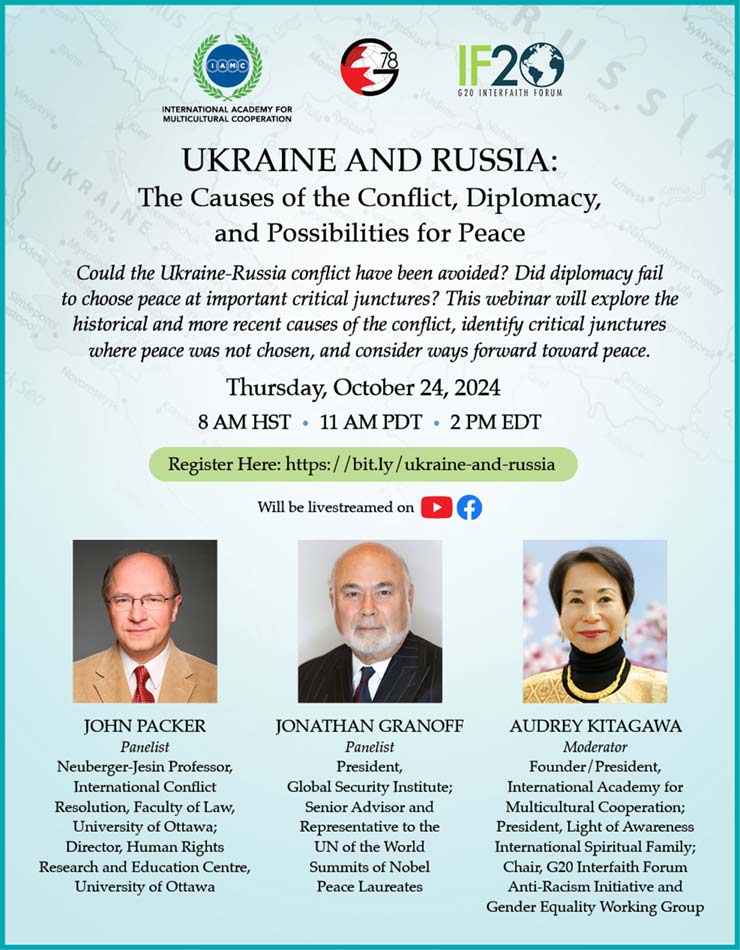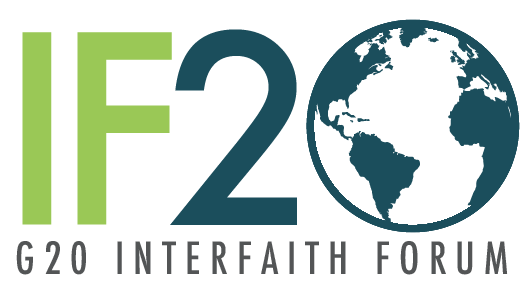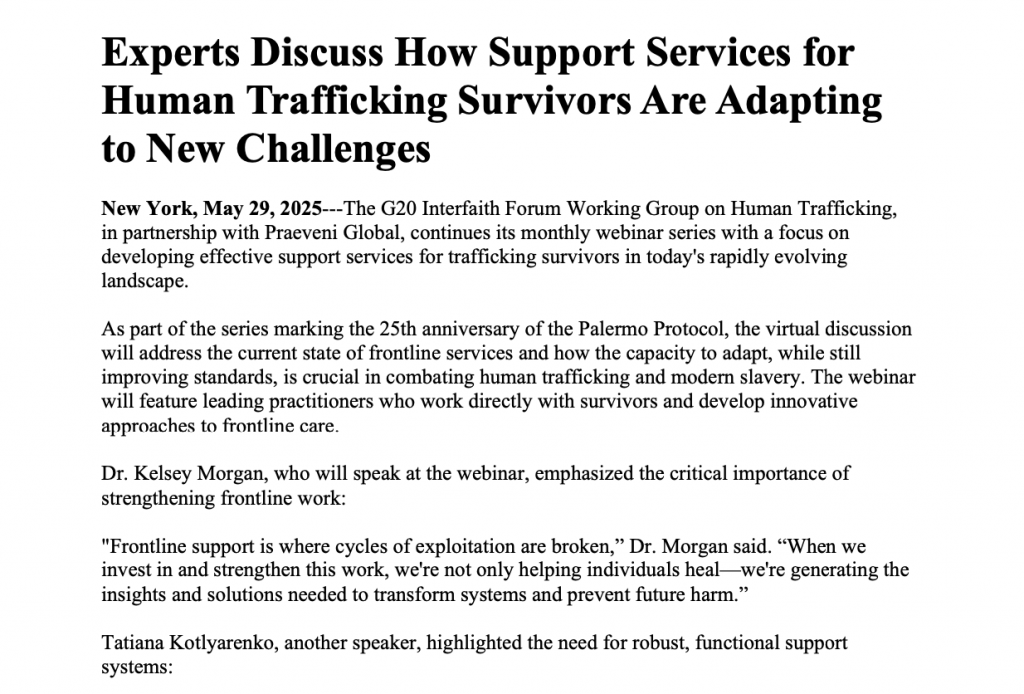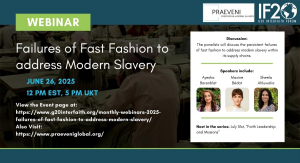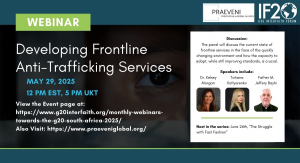Human Trafficking and Modern Slavery:
Towards the 2025 South Africa G20
Biography :
Ayesha is a social entrepreneur with a passion for building sustainable supply chains that respect people and our planet. With over 15 years of leadership in promoting social justice and sustainability within the fashion industry, she founded Remake to mobilize citizens to demand a more just, transparent, and accountable fashion industry. Remake’s free educational resources, advocacy campaigns, and sustainable brands directory are focused on making fashion a force for good.
Ayesha has worked across the public, private, and civil society sectors to promote the rights and dignity of the women who make our clothes. Prior to founding Remake, she led brand engagement at Better Work, a World Bank and United Nations partnership, to ensure safe and decent working conditions in garment factories around the world. Prior to this, she ran the fashion vertical at BSR, providing strategic advice to brands including Levi Strauss and Company, Marks and Spencer, Nike, and the Gucci Group on the design and integration of sustainability into business. She has a master’s degree in public policy from the University of California, Berkeley.
She counts both Karachi and San Francisco as her homes, and she is happiest when spending time with the women who bring our fashion to life and amplifying the stories of fashion’s most essential workers.
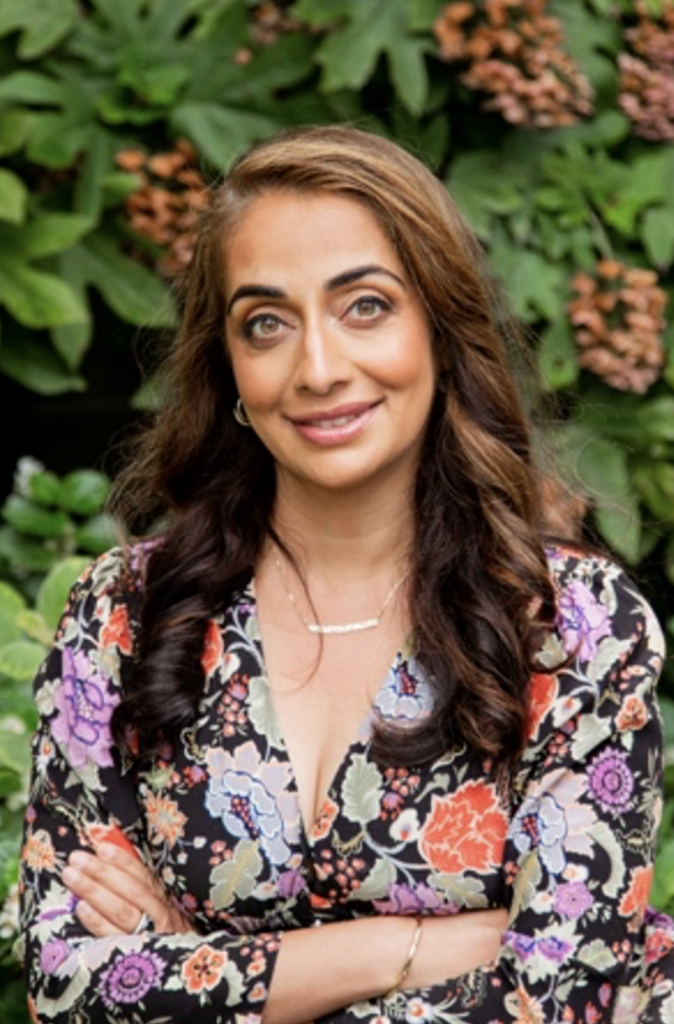
Maxine Bédat
Biography :
Maxine is the founder and director of New Standard Institute, a think and do tank using data to drive accountability in industry. She is also the author of the book, UNRAVELED: The Life and Death of a Garment, a Financial Times Book of the Year and translated into several languages. Prior to NSI, Maxine co-founded and was the CEO of Zady, a fashion brand and lifestyle destination creating a transparent and sustainable future for the apparel industry. Bédat has been recognized by Fast Company in its Most Creative in Business, Business of Fashion’s BoF 500, the definitive index of people shaping the global fashion industry, and Oprah’s Super Soul 100, for leaders elevating humanity. Bédat began her career in international law working at the Rwandan Criminal Tribunal and Allen & Overy, and received a Juris Doctor from Columbia Law School.
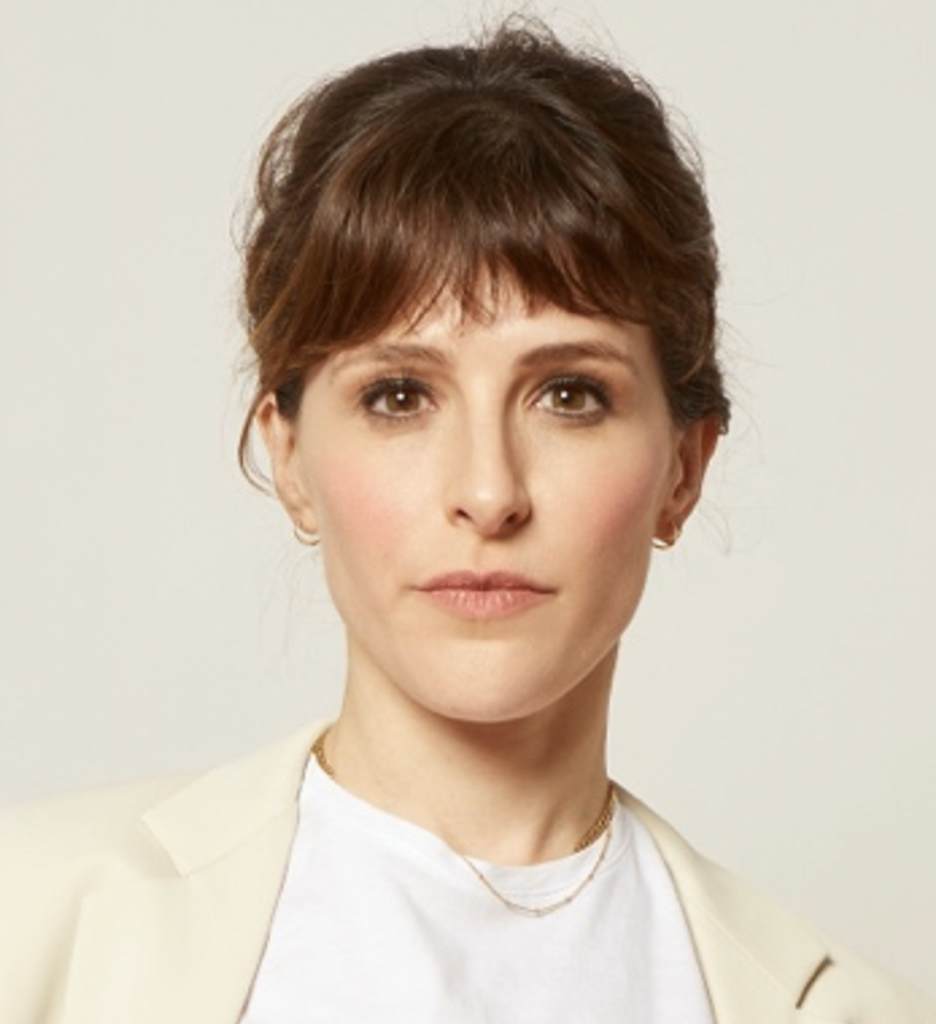
Sheela Ahluwalia
Sheela Ahluwalia is the Director of Policy and Advocacy at Transparentem. In this capacity, she leads efforts to pursue accountability and achieve systems change, related to human rights and environmental abuses in supply chains. She previously served as Director of Labor Investigations and Senior Labor Analyst.
Prior to joining Transparentem, Sheela served at the US Department of State for nearly a decade, where she helped develop and implement policy across Asia, North Africa, and the Middle East. In the Department’s Office to Monitor and Combat Trafficking in Persons, she advised senior-level US officials and foreign counterparts on policies and programs, produced country assessments for the annual Trafficking in Persons Report, and exposed previously hidden forms of forced labor. She also negotiated human rights resolutions in the UN General Assembly and Human Rights Council, and managed almost $10 million in foreign assistance to promote justice in West Africa. Previously, Sheela worked for the World Bank, the US Department of Labor, human trafficking NGOs in India and the United States, and an indigenous rights organization in Ecuador. She has been part of the antitrafficking movement since 2002, when she began volunteering for a community group in Washington, DC.
Sheela earned an M.A. from The Johns Hopkins School of Advanced International Studies and a B.A. from Tufts University.
“In a moment of regulatory flux and rising trade protectionism, companies must not lose sight of their responsibility and obligation to protect the workers who power global supply chains. Preventing labor exploitation isn’t a “nice-to-have” — it is necessary for conducting business responsibly and in accordance with the law.”
Moderator

Duncan Jepson
Director of Strategy and Operations, Praeveni Global
– To read Duncan’s bio please go to <Read Bio Here>
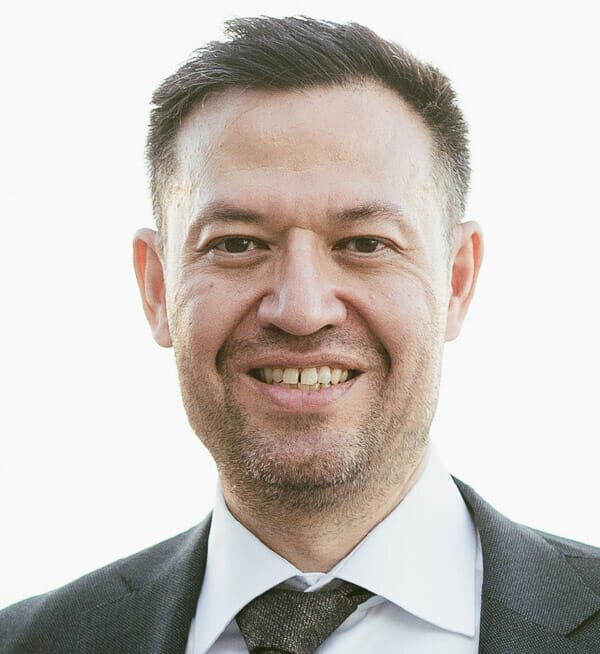
About the Monthly Webinars on Human Trafficking and Modern Slavery
To mark the 25th anniversary of the Palermo Protocol on human trafficking, the G20 Interfaith Forum, in conjunction with Praeveni Global, is holding monthly webinars leading to the G20 meeting in South Africa in November.
The webinars bring together current leaders in faith and in the field to discuss the impact to date and the much needed work ahead.
When:
12pm EST/5pmUKT Last Thursday of each month from March to October.
Format:
One hour. Four speakers and one moderator. Conversational style but each speaker speaking for four minutes at the start.
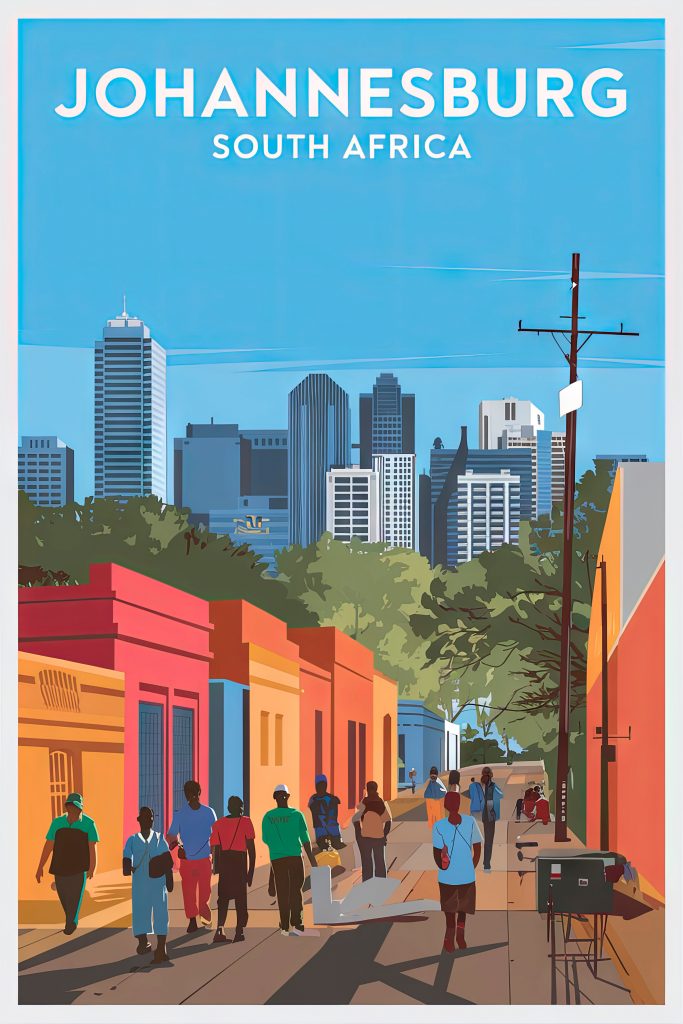
Part 1: Ukraine and Russia:
The Causes of the Conflict, Diplomacy, and Possibilities for Peace
The October 24, 2024 webinar, “Ukraine and Russia: The Causes of the Conflict, Diplomacy, and Possibilities for Peace” explored the historical and more recent causes of the conflict to identify critical junctures where peace was not chosen, and consider ways forward toward peace. The event was co-sponsored by the Group of 78, the G20 Interfaith Forum, and the International Academy for Multicultural Cooperation.
Panelists
Professor John Packer
Neuberger-Jesin Professor of International Conflict Resolution, Faculty of Law, University of Ottawa; Director, Human Rights Research and Education Centre, University of Ottawa
Jonathan Granoff, J.D.
President, Global Security Institute; Senior Advisor and Representative to the UN of the World Summits of Nobel Peace Laureates
Moderator
Audrey E. Kitagawa, J.D.
Founder/President, International Academy for Multicultural Cooperation; President, Light of Awareness International Spiritual Family; Chair, G20 Interfaith Forum Anti-Racism Initiative and Gender Equality Working Group
SPONSORS:
G20 Interfaith Forum | Group of 78 | International Academy for Multicultural Cooperation
Part 2: Ukraine and Russia:
The Increased Nuclear Threat in These Uncertain Times
The February 13, 2025 webinar, “Ukraine and Russia: The Increased Nuclear Threat in These Uncertain Times” will be a part 2 of the Ukraine and Russia webinar series discussing recent causes of the conflict to identify critical junctures where peace was not chosen, and consider ways forward toward peace.
Panelists
Walter Dorn
Professor, Defence Studies, Royal Military College of Canada (RMC) and Canadian Forces College (CFC);
Director, Canadian Pugwash Group
Paul Meyer
Fellow, International Security and Adjunct Professor, International Studies, Simon Fraser University;
Founding Fellow, Outer Space Institute;
Senior Advisor, ICT4Peace;
Director, Canadian Pugwash Group
Moderator
Peggy Mason
President, Rideau Institute on International Affairs;
Board Member, Group of 78;
Vice-Chair, Canadian Pugwash Group;
Advisory Board Member, Canadian Network to Abolish Nuclear Weapons
SPONSORS:
G20 Interfaith Forum | Group of 78 | International Academy for Multicultural Cooperation
